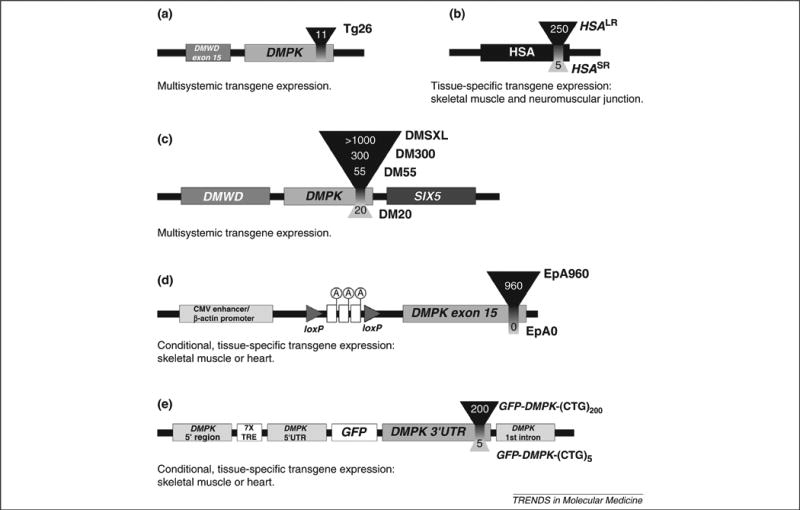Figure 2.

Schematic representation of CUG-expressing transgene constructs comprising multiple genetic elements. A brief description of the spatial profile of transgene expression is included for each insert. (a) Tg26 mice carry ∼25 copies of a fragment of human genomic DNA containing the DMPK gene sequence with 11 CTG repeats and the last DMWD exon. (b) HSASR and HSALR transgenic mice carry a fragment of human skeletal actin (HSA) gene, containing a short 5-CTG or an expanded 250-CTG repeat sequence inserted in its final exon, respectively. HSASR lines carry 1-20 copies of the transgene, whereas HSALR lines have 1-12. (c) DM20, DM55, DM300 and DMSXL transgenic mice carry one to three copies of a large fragment of human genomic DNA containing the three genes of the DM1 locus and a variable number of CTG repeats: 20, 55, ∼300−600 and ∼1000−1800, respectively. (d) Inducible EpA mice carry the human version of DMPK exon 15, either without repeats (EpA0 line) or with an interrupted 960-CTG expansion (EpA960 lines). Transgene expression is driven by the cytomegalovirus (CMV) enhancer and (β-actin promoter. The polyadenylation cassette located between the two loxP sites prevents DMPK exon 15 expression prior to recombination. Tamoxifen administration induces tissue-specific Cre-mediated recombination, removes the transcriptional stop and results in tissue-specific expression of control and expanded transcripts. (e) GFP-DMPK-(CTG)n mice carry a tetracycline-responsive version of the DMPK promoter to express a GFP transcript fused to the DMPK 3′′UTR containing either 5 or 200 CTG repeats. These animals also express the reverse tetracycline transactivator constitutively. In the presence of doxycycline, the transactivator binds to the tetracycline response elements (TRE) and activates expression of the GFP-DMPK-(CTG)n transgene.
